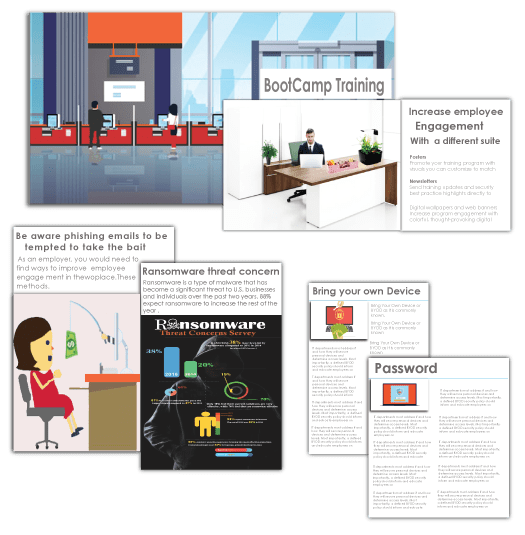
Security Awareness
for
IT Executives
Training Modules
Executives have always been looked upon as whales, so to speak, by hackers. They have more privileges and more sensitive information with them than most of the employees in a company. It is in the company’s best interest that they do everything in their power to avoid their executives from being hacked. If compromised, the hacking of executives would potentially do more harm than a regular employee being hacked.
-
About this course
Our executives are too busy to be involved in our cybersecurity awareness and training program." We hear this statement a lot from our customers every day. CISO’s are often unable to get C-level executives, senior managers, and board to participate in security awareness and training programs. There is only a small percentage of CISO’s directly reporting to the board directly, the challenge is that much greater to get permission to educate the highest levels of staff in an organization. This course provides practical, to-the-point training for the busy executive, in everyday language, complete with examples that are easy to understand
-
Why should you take this Course ?
As an executive, it’s important for you to understand a harsh and terrifying reality: Your company is under constant attack from hackers, thieves, and other cybercriminals. They are looking for a way into your network so they can steal information or money, spy on you, and possibly cause havoc up and down the line. And they are using you and other high-level executives as bait.
-
What will you learn by taking this course?
Security awareness training is the process of providing formal cybersecurity education to your workforce about a variety of information security threats and your company's policies and procedures for addressing them.
-
Chapter 1: The benefits of Information Security Awareness
Having an on-demand information security and privacy awareness program (or two) in a business has many benefits, including: Establishes organization policy and program —It is a best practice for an organization to have an information technology security awareness program.
-
Chapter 2: Controlling Threats with Security Awareness
Protecting business data is a growing challenge but awareness is the first step. Here are the top threats to information security today
-
Chapter 3: Point-of-Attack Education
The Point of Attack is that first thing the audience will see or hear as the play begins. And it's one of the few decisions you face in this business that can make or break a great idea for a play.
-
Chapter 4: Password Management
When simple passwords no longer provide sufficient security, look to other options. Here are some ways to modernize password management for your enterprise.
-
Chapter 5: Phishing
Attackers will commonly use phishing emails to distribute malicious links or attachments that can perform a variety of functions.
-
Chapter 6: Identity Theft
What happens when someone steals your personal information to commit fraud. The identity thief may use your information to apply for credit, file taxes, or get medical services. These acts can damage your credit status, and cost you time and money to restore your good name.
-
Chapter 7: Social Engineering
Social engineering is the art of manipulating people so they give up confidential information, which includes your passwords, bank information, or access to your computer. Follow this guide to learn the different types of social engineering and how to prevent becoming a victim.
-
Chapter 8: Malware
A wide variety of malware types exist, including computer viruses, worms, Trojan horses, ransomware, spyware, adware, rogue software, and scareware.
-
Chapter 9: Smartphone Data
A smartphone is a mobile device that combines cellular and mobile computing functions into one unit.
-
What are our compliance obligations?
While one can argue that the reasons of maintaining the confidentiality, integrity, and availability of data and services to their employees, partners, consumers, and customers is a sufficient reason to have a robust information security program, many organizations are not aware that they are legally required to have a robust program. Sometimes the subtlety of whether or not you must comply with a particular compliance regime is difficult. Getting expert help from a trusted advisor is recommended if there is any question.
-
Does anyone on the board have Information Security and Risk Management expertise?
Many information sources have begun talking about the importance of information security and risk management oversight by the board of directors. Computer and data systems were once a business enhancement – they have transitioned to business-critical tools (our ransomware experience has made this obvious). As a result, boards must be aware of the confidentiality, integrity, and availability of their data and computing services and systems. At a minimum, there should be a formal mechanism (usually a formal committee) that includes experts in information technology, security, risk management, and business to digest the current threat and risk landscape and make recommendations to address these risks to the board.
-
Am I spending enough / appropriately on information security-related tools and controls? (Is there a tool I should buy?)
Similar to the staffing question, the answer here is nuanced. It depends. In our experience with helping organizations get their arms around their threats and risks and developing a reasonable and appropriately-scaled information security program, they have most (if not all) the licenses and tools they need to address their risks. The difficulty is in their configuration and the ability of the information technology organization to get meaningful information from them. Often the roadblock to an effective program is one of the time and availability of IT staff. It is not uncommon for IT staffing to be less than what is required given the size and complexity of the organization. In addition, automating tasks that cause IT staff to be diverted from projects due to an endless break/fix cycle can improve the chances of information security-related projects being successful.
-
Do our documented policies match what is actually happening in practice?
Often an organization’s written policies and standards are very well written and line up with their compliance obligations. An auditor comes in, reviews the documents, and gives the documents a passing grade… Unfortunately, the things written in these documents do not line up with what is actually happening in the organization. Our approach is to have lean, well-organized documentation that addresses the threats and risks facing an organization in clear and concise language. The end result is that instead of having compliance without real information security, an organization is secure by design and compliant by default.
-
Do we know where our data is and how it is protected (data lifecycle management)?
Ultimately, an information security program is concerned with the confidentiality, integrity, and availability of the data and services that utilize, store, transmit, and process that data. Knowing the nature of that data, how sensitive it is in terms of compliance obligations, where it lives, where it is transmitted, where it is used, who has access to it, and how long it should be kept is vital. For many organizations that data is core to their business. Just like an auto repair shop must keep track of and care for their tools, an organization must keep track of and care for their data and services. Very often this starts with classifying the data and establishing rules for the various classifications.
- Key Features:
- Created by a Security expert :
- Access period : 12 months
- Course duration : 40+ hours
- Quizzes & revision exams :
- Certificate of completion :
- Support : 24/7 hours

Executives Are a Group That is Most at Risk

Executives have more access to sensitive data and systems, making it paramount that they are educated about the risks of handling this information. We have seen countless phishing attacks that target on the highest levels of executives and ignoring these staff in training could be a costly oversight and loophole in your end user security plan.
company’s executives are concerned about organizational safety. But they might not understand complicated attack vectors and technical measures implemented by your security team. While explaining good security practices, the explanation should be clear, concise, and straightforward.
They're Setting a Good Example for Staff
When executives take training, they're ensuring their department takes training more seriously. For the laggards in their department not completing training, having the head of the department ahead of them is a convincing argument for them to complete their assignments. Even better, it's a great step in creating a culture of more secure behavior.
With responsibility comes accountability. A lack of awareness of legal regulations regarding cyberattacks can be a professional disaster. Due to their high status within their respective companies, many executives are being held accountable for high profile breaches—the recent data breaches at both Target and Equifax resulted in both CEOs resigning—even if they weren’t the individual responsible for the breach. All members of the executive team should receive up-to-date training regarding current legal requirements as a key part of their roles as cybersecurity leadership.

Why security awareness training to your Executives

As an Executives member you need to understand adequate about cyber security so you can have a confident conversation with your experts. These days cyber Security is everyone’s problem. With cybercrime damages expected $6 trillion by 2021, it is hardly surprising that cybersecurity has become a Executives level important topic now a days. The Executives members are responsible for implementing of a sound cyber security program, including the overall guidance and direction of setting a cultural value related to risk awareness, policy and strategy, defining risk profile and creating security initiatives and priorities for organization.
Why is cybersecurity important to the Executives?
Cybersecurity is no longer something that only impacts your IT department or Information Security team. When a security incident hits an organization, it can cost USD 3.92 million – this being the average cost of a cyber-attack in 2019. Data breaches can cause devastating financial losses and affect an organization’s reputation for years. Many of the costs incurred by a security incident are indefinable. Loss of brand loyalty, for example, is difficult to qualify in the long term and costly to reinstate, once lost.

Being an Executive member, you will be targeted always

Senior executives in any organizations are regularly the target of cyber-attack by cyber-criminal, because of their access to valuable assets within the organization.
Implementing cyber security awareness program, security policies will help to mitigate cyber risk. It is critical that Board members and stakeholders must understand and follow their organization’s cyber security policies, so that when a cyber-criminal tries to manipulate them, staff can identify that something is unusual.
We work with you
Your organization’s executives may have a good high-level understanding of cyberattacks and business risks. However, security awareness gap in modern organizations is broad and deep. Apart from reporting security incidents, security professionals also have a responsibility to bridge the existing gap.
Executives who take cyber security risk seriously are uniquely positioned to help senior management tackle cyber-security risk. When you partner with us, you benefit from our extensive knowledge and skills as we develop your business’s cyber security. As one of top cyber-security firm, we offer nearly 30 year’s experience in the technical, commercial and regulatory aspects of cyber security.

COURSE MODULE ROLE BASED TRAINING FOR EXECUTIVES

Duration:
- 8/40 Hours
Ways to Learn :
- Virtual Training
- Virtual Instructor-Led Training
- Classroom Training
Course Audience:
- Intended for Managers
Course Language :

Course Topics:
Chapeter 1: Introduce of Execuitve Security
Chapeter 2: Controlling Threats
Chapeter 3: Point-of-Attack Education
Chapeter 4: Password Management
Chapeter 5: Identity Theft
Chapeter 6: Social Engineering
Chapeter 7: Malware
Chapeter 8: Smartphone Data
Who should take this course?

The course is designed for executive and executive level employees. No need have basic knowledge for this course.
When an enterprise's employees are cyber security aware, it means they understand what cyber threats are, the potential impact a cyber-attack will have on their business and the steps required to reduce risk and prevent cyber-crime infiltrating their online workspace. Colleagues need to understand the role they play in strengthening a business’s cyber security. In most cases, it needs to be taken back to the very basics. Cyber-crime shows no signs of slowing down, and a cyber-attack has the potential to incapacitate an organization. Training your employees and making them aware is your best defense.
Boost Engagement with delivering Communication Tools

Increase employee engagement with a different suite of communication tools like:
Posters
Promote your training program with visuals you can customize to brand... more
Newsletters
Send training updates and security best practice highlights directly... more
Digital wallpapers and web banners
Increase program engagement with colorful thought-provoking messaging... more
Training Videos/Animations
Strengthen key awareness concepts and skills through stylish visual... more
Why Aspire Tech
Award-winning courses
Aspire's award-winning online courses and programs are created and delivered by a renowned Cyber Security specialist.
The perfect fit for business
Plans for small to large businesses that are flexible to match your budget. There is a volume discount available.
Cost effective training
For a fraction of the expense of traditional classroom training, train thousands of employees in numerous locations.



